by Fern Shaw | Jan 3, 2012 | Uncategorized
The biggest advantage of bottled water is that it is convenient and safe. When you are travelling to work, or on holiday, you can never be sure if there will be clean and safe drinking water at your destination or on your way there. As with all our bottled water products, AquAid provides bottled water coolers and water filtration that will ensure you get only the best fresh water available.
Our bottled water is pure and filtered to remove any harmful chemicals and bacteria, leaving you feeling better and healthier. Many water processing plants use dangerous chemicals to purify their water, but the AquAid range of water coolers do not. If the fluoride content in your unfiltered tap water is too high, it can lead to discoloured teeth and fragile bones. Our water is as clean as nature intended it to be.
If you are concerned about the environment, and do not want to install bottled water coolers, then we have the perfect solution for you. Our range of AquAid mains fed water coolers connect directly onto your water mains at your home or office, and will provide you with the cleanest and most convenient fresh water available. This system uses the unique and highly effective AquAid Doulton filtration system to ensure that your water is as clean and healthy as any bottled water. With this system installed in your home or office, you can conveniently fill a water bottle to take with you on all your journeys.
Other benefits of bottles water is that it will ensure you are properly hydrated at all times. Tests have shown that a drop in body fluids can lead to poor mental and physical performance of up to 30%. Carrying fresh water with you, and having regular sips of water will ensure that you are never thirsty, and that you will always perform at your best.
No matter what sort of water cooler you are looking for, at AquAid we have the perfect solution for you. Have a look at our fantastic website for the full range of water coolers that we have for your convenience and health.
by Fern Shaw | Jan 3, 2012 | Uncategorized
With a large and very diverse range of water coolers that we supply at AquAid, people are often not sure which model is best suited to their needs. It all comes down to the amount of water that you, your home or our office consumes each day. Depending on that, we will be able to assist you with the best possible bottled water solution.
The most popular water cooler for the office that we supply at AquAid is the range of free-standing water coolers. The benefits from the free-standing water coolers are almost endless. Just having the unit in our office will encourage your staff to drink more water during their working day. The benefits of drinking clean, fresh and filtered water includes added mental performance, better health and more physical strength. Tests have shown that not drinking enough water can lead to a decrease of up to 30% in mental performance. These shocking results are reason enough for each office to have water available to all their office members at all times.
Our free-standing water coolers will ensure that your staff perform at their best, and that productivity in the office will not decrease due to a lack of water.
We are able to provide fresh drinking water at a range of different temperatures. From nice ice-cold water in the summer to room temperature or hot water for the cold seasons, we can ensure that your water is just the way you prefer it. The adjustable thermostat will ensure that you can accurately control your water coolers’ temperature. The noiseless circuit will not interrupt your staff, and the large drip tray will ensure that no water is messed on the floor. Our free-standing water coolers are available in a large selection of different models, and we will gladly assist you with all your water needs.
If you do not have the large requirements of an office, then we are able to give you compact water coolers suited for a desktop or confined space.
If however you find that your staff or household is consuming water at a never-ending rate, then we are able to install mains fed water cooler. These coolers connect directly onto your main water supply. They will provide an uninterrupted supply of fresh and clean drinking water. Our unique AquAid Doulton water filtration system will ensure that the water is clean and as pure as water from our bottle fed water coolers.
No matter what your cooler needs might be, at AquAid we will have the perfect cooler for your individual needs.
by Fern Shaw | Jan 3, 2012 | Uncategorized
The Africa Trust was founded by AquAid to achieve sustainable solutions to poverty.
Partnership with Environment Africa in Zimbabwe
A new partnership was agreed with Environment Africa in Zimbabwe at the start of this month. Under the terms of this new partnership, thirty Elephant Pumps have already been installed in villages across Zimbabwe providing clean drinking water and also water for herb/vegetable gardens and orchards. Environment Africa have developed highly productive designs for vegetable and herb gardens which produce far more economic and nutritional benefit than the typical vegetable gardens in rural Zimbabwe. The Africa Trust is keen to encourage innovation in agriculture to lift rural communities out of purely subsistence approaches. This includes the development of orchards and sustainable woodlots and the introduction of new crops.
Tanzania Pipeline
Work on the Tanzania pipeline is progressing well ahead of schedule with more than half of the project having been completed already. Thousands of villagers are already benefiting from a reliable supply of safe clean water for drinking and domestic use. The whole community came together to dig over two kilometres of trenches which were in parts very deep due to the local topography and the need to maintain a gradual gradient for a perfect gravity fed system. High pressure has been achieved at the new standpipe taps, which is a source of amazement to the villagers who found it hard to understand how gravity alone can create such high pressure in a closed system. This supply of water has been made possible due to contributions from AquAid water coolers. A visit to the project by the Chair and Chief Executive of The Africa Trust has been planned for February 2012 which will include some business skills training to allow the communities to make best use of a newly established development fund.
Bananas paying for Fees and More in Rural Schools
Feedback from the first season of the bananas for fees project in Zimbabwean schools has been extremely positive:
“We are happy because through The Africa Trust’s assistance with irrigation material and seedlings we have realised profit from the sale of the bananas. This will cater for our learning materials, payment of school fees for orphans and vulnerable students who tend their banana plants, renovations of old buildings as well as supplementary feeding of the students” Mrs Mandikiyana (Head Mistress at Ruda Primary school)
It is clear that this project can be scaled up to provide a significant source of income for poor rural schools in addition to providing orphans and other vulnerable children with a means to pay their own way through school.
Business Skills Training in Zimbabwe
The business skills training programme in Zimbabwe has grown over the last two months. Training is typically followed by the development of business plans and the allocation of small grants and/or loans by The Africa Trust. Monthly follow up meetings help to ensure that the businesses remain on track and allow beneficiaries to share their experiences and help each other solve the challenges they are facing. This is helping to develop a culture of mutual encouragement and support which can uplift entire communities. Some of the businesses that have been established or assisted to expand over the last two months include:
A Grinding Mill
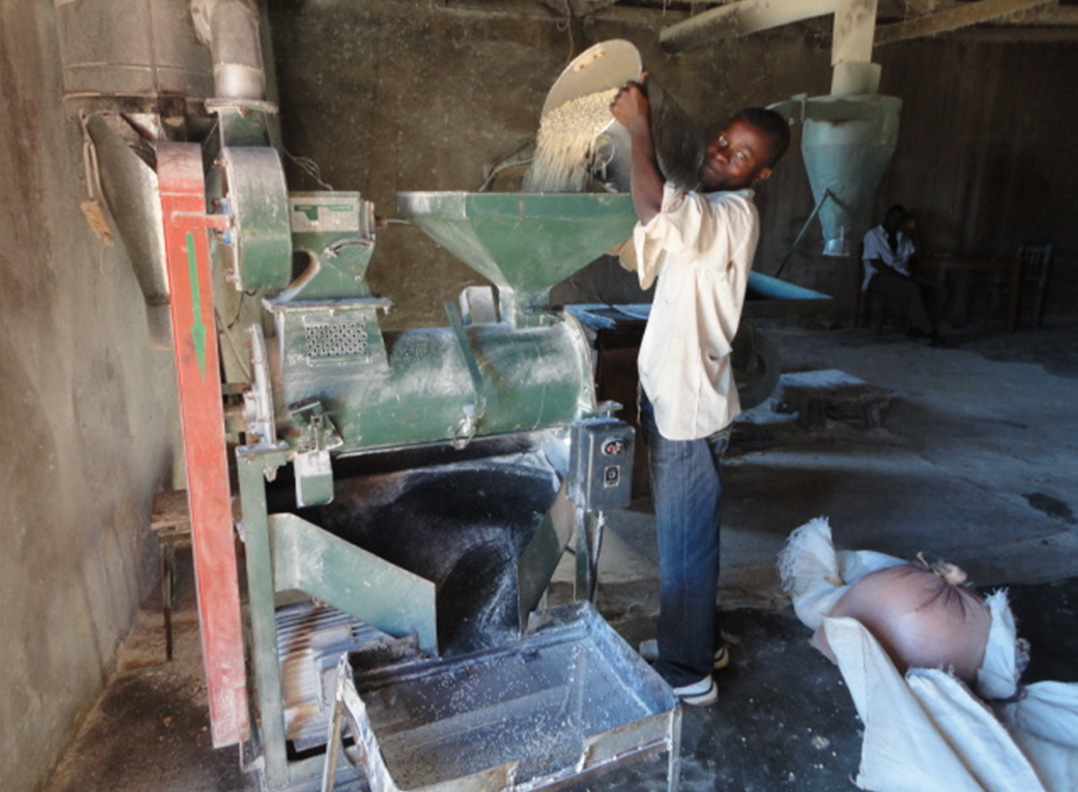
This grinding mill is now providing an important service to hundreds of families who were previously forced to carry sacks of grain more than seven miles to the nearest grinding mill or to grind the maize by hand which can take several hours every day. The time saved can be used productively on agricultural projects. There are plans for further expansion of this grinding mill to include an oil press which will produce cooking oil from sunflower seeds with the residue being used for chicken feed production.
Poultry Projects
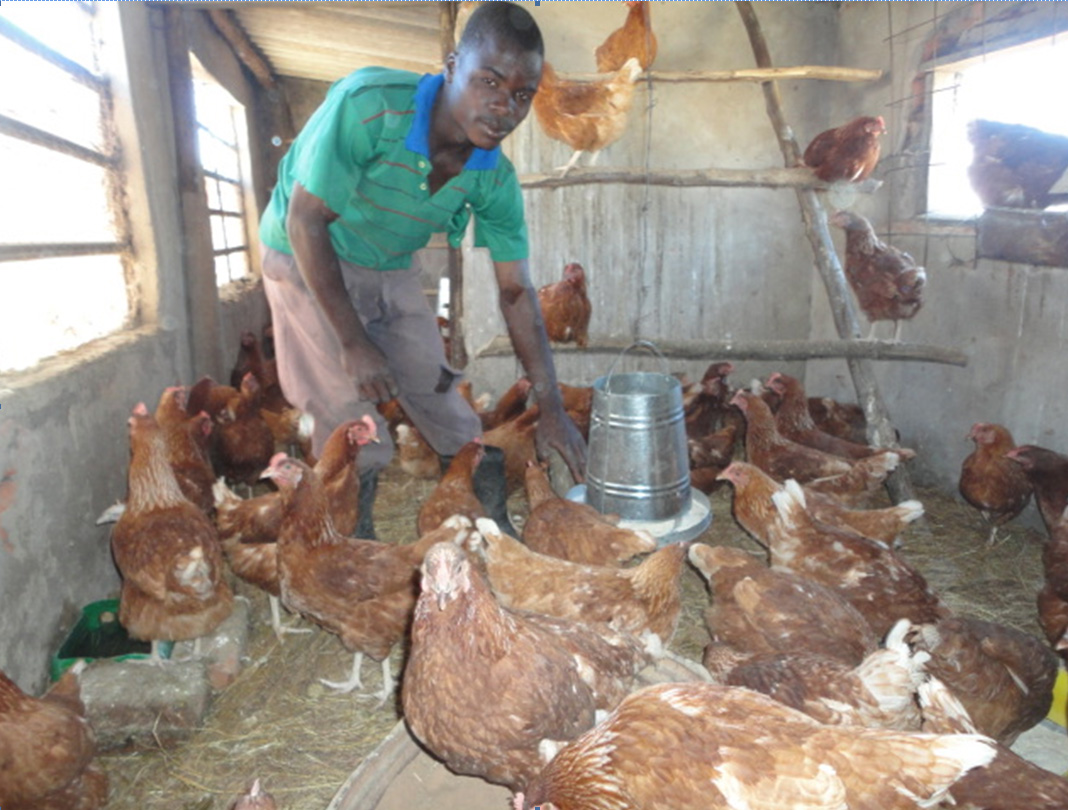 Poultry projects can work well in rural communities if they are properly managed with tight financial discipline. In addition to providing business training and small loans or grants, The Africa Trust is helping to provide specialist training so that common problems such as disease and inappropriate feeding regimes can be avoided.
Poultry projects can work well in rural communities if they are properly managed with tight financial discipline. In addition to providing business training and small loans or grants, The Africa Trust is helping to provide specialist training so that common problems such as disease and inappropriate feeding regimes can be avoided.
Piggery Projects
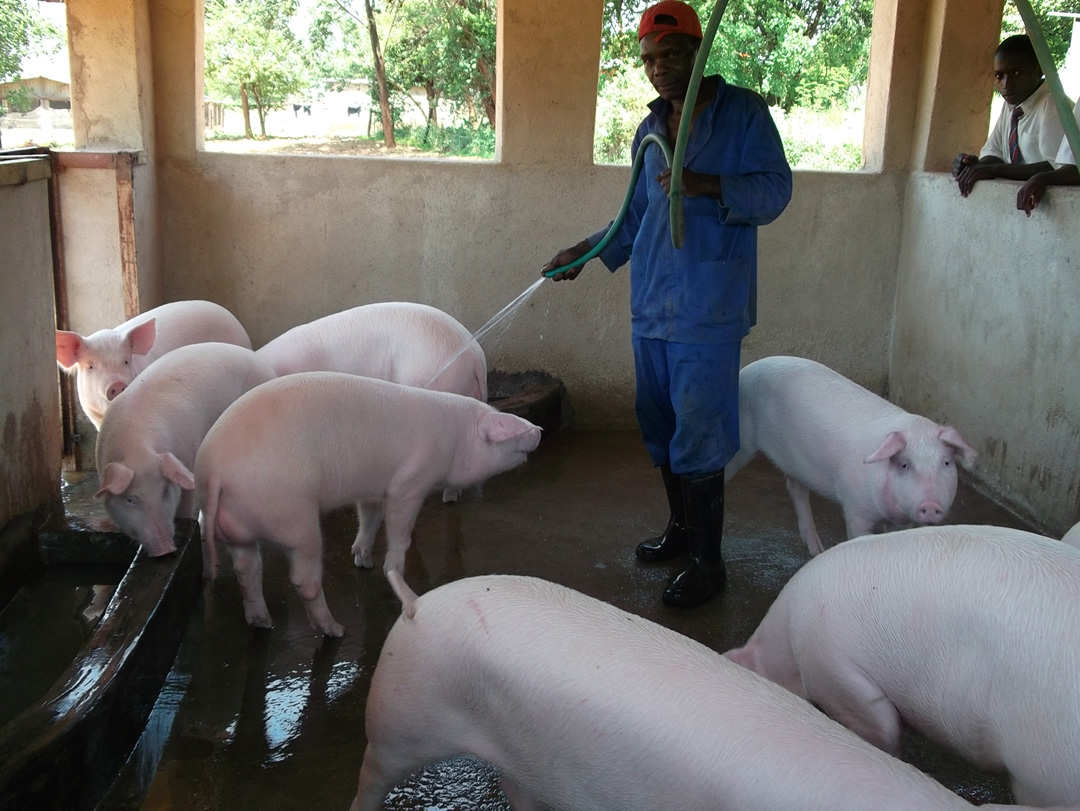
The second most common livestock project in rural areas of Zimbabwe is the intensive rearing of pigs. Several new piggery projects have been started with assistance from The Africa Trust and, as with the poultry projects, there has been some specialist training provided in addition to basic business skills training.
A Saw Mill
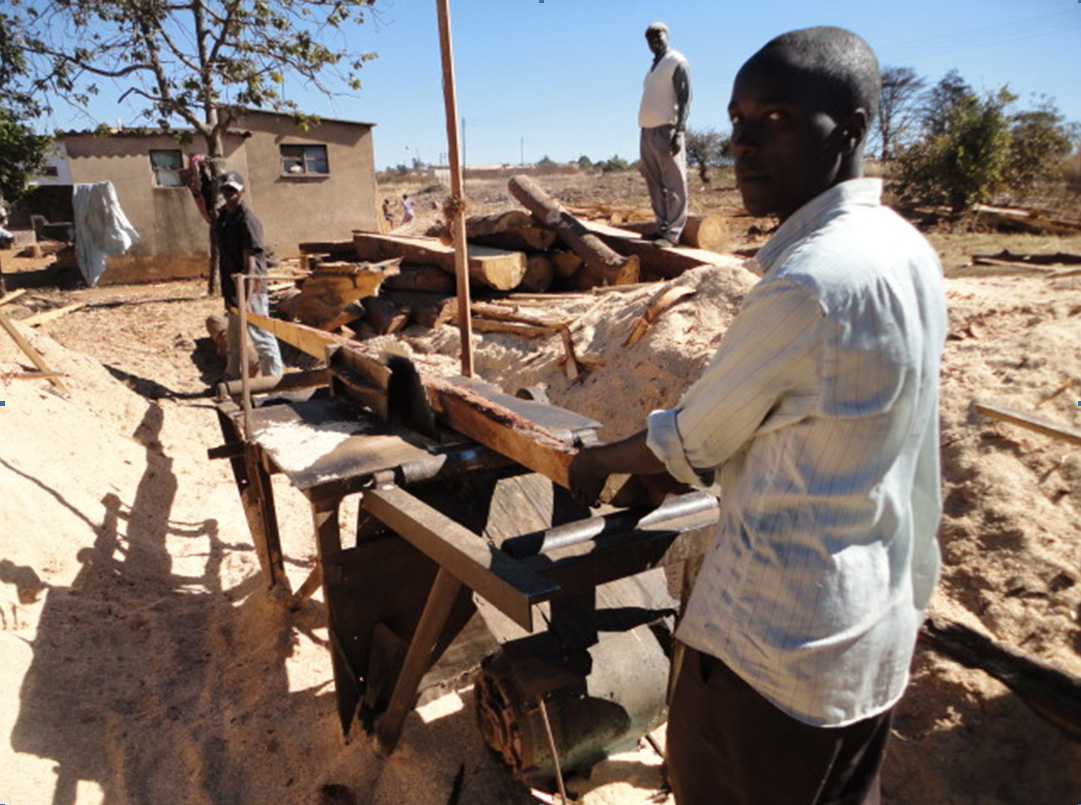
This saw mill is now expanding with assistance from The Africa Trust. The business skills training has allowed for a transformation in the business model to make the business much more profitable and efficient with some investment to provide new machinery and tools. There is significant demand for timber from a nearby town and the supply of logs from sustainably managed plantations is more than adequate. Uses are also being found for the sawdust which was previously allowed to rot.
Vegetable Growing Projects
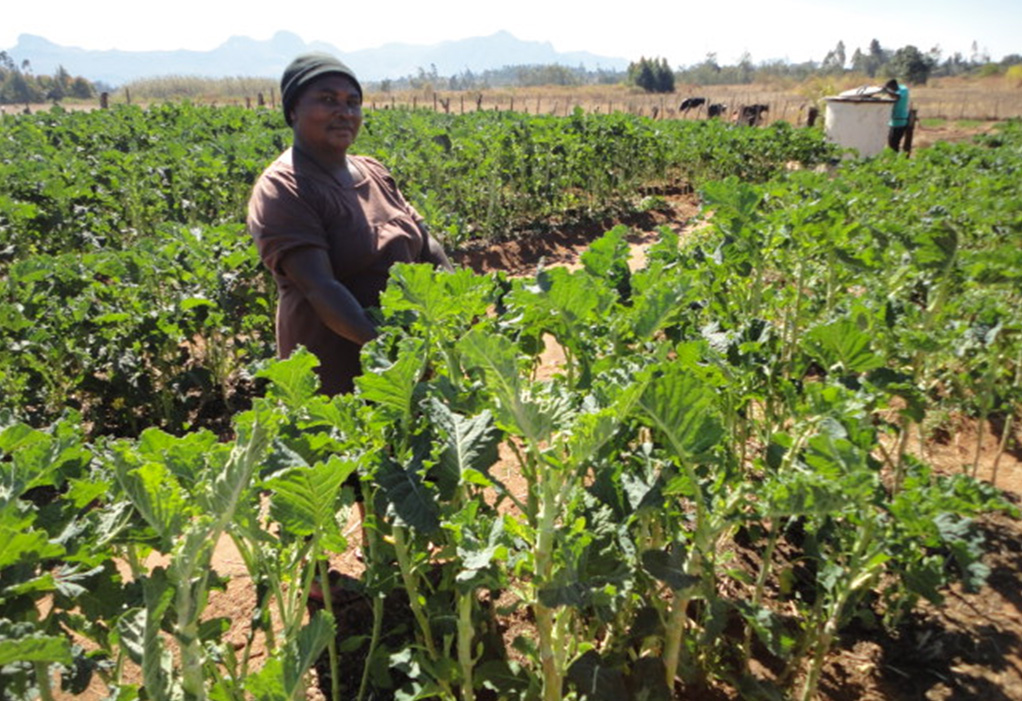
Many farmers are keen to start or expand vegetable growing projects. There is typically a lack of variety with regards to crop choice which the Africa Trust is addressing with introduction of new varieties which do well in each region. There is also a lack of understanding of how to preserve vegetables at times when production exceeds demand. Leafy vegetables such as cabbages and rape can be sun-dried, as can tomatoes, but it is important that this is done in the correct way to avoid the risk of poisonous fungus and other sources of contamination. The drying of fruit is also something which is being encouraged by The Africa Trust to help provide a year round source of food for families who previously relied on hand-outs of food aid during the ‘hungry season’ or in years where the field crops fail.
Business skills training in Schools
This is a new programme which has been developed and will be formally piloted in ten schools over the coming months now that the initial testing and market research has been completed. The drive behind this initiative comes from the fact that more than 90% of school leavers in Zimbabwe will not be able to find any formal employment. Business skills training will be incorporated into the general studies lessons over the course of the last year at school, both at O-level and A-level. Students will then be required to produce business plans for small businesses that they intend to start up before or after leaving school and competitions will be used to provide some small grants and loans for the most promising projects.
Over the last year, the business skills training programme has produced impressive results both in Uganda and Zimbabwe. The level of poverty is greater in rural Zimbabwe and access to funding there is a major problem in most cases. The Africa Trust has been providing a number of small grants and some loans to get businesses started or to assist with expansion. The balance will shift into next year to become primarily based on loans. This means that funds which return when loans are repaid can be re-invested to assist other people thereby creating improved sustainability for the programme and greater impact for the same level of funding.
Pump Building and Maintenance as a Business
Into the coming year, some of the work the Africa Trust is doing to install new Elephant Pumps and to service, repair and maintain existing pumps will be contracted out to small groups of trained pump builders who will be assisted to set up their own pump building and servicing businesses. This is in line with The Africa Trust ethos of sustainable solutions to poverty. Currently the cost of servicing and repair for existing pumps has been absorbed by The Africa Trust with funding coming from AquAid water coolers allowing more than a million people to benefit from a reliable supply of clean water in Zimbabwe. Since rural communities are being helped to gain economic benefit from their pumps through the introduction of agricultural projects, it is reasonable to expect beneficiaries to start paying for servicing and repair of their pumps when they are unable to do the work themselves.
by Fern Shaw | Dec 19, 2011 | Uncategorized
Is your water cooler environmentally friendly? Can you save lives by simply drinking water?
When a child is born, roughly 80% of their body weight is water, whereas the average adult has 70% of his body mass made up from water. Our fantastic planet’s surface is roughly 75% water, but the water available to humans for consumption is less than 0.03% of that.
These statistics should be reason enough for the value of water, and the way the world handles this resource to cause us to protect this resource better. The reality is far more shocking. The worst abusers of our available water resources are humans in first world countries. The average American will use and waster around 500L of water every day, where the average African has less than 5L a day to use for cooking, cleaning and bathing.
More people in Africa die from water born diseases than from any other reason, or even wars. The simple act of washing your hands can reduce the chance of getting diarrhea by around 35%.
As little as one pound a day can assist a single child in Africa to have access to water for an entire year. That is the reason why at AquAid we support The African Trust, and our commitment to aiding the continent in reducing and alleviating poverty. Over the last few years, we have provided over 6 million pounds, from the sale of our products to assisting this project. We donate a portion of every water cooler and other products that we sell to The African Trust, and for every person that follows our Twitter and Facebook groups, we will give an additional Pound to the fund.
No matter what your water cooler needs might be we are able to install and supply a unit that will suit your individual and specific needs. Our AquAid water coolers are perfect for home and office use, and they will give you clean and healthy water on demand.
by Fern Shaw | Dec 19, 2011 | Uncategorized
Have you ever stopped to wonder what the health benefits of water might actually be? Our aim at AquAid is to aid you in understanding the benefits of water, and to explain to you why it is so important to your health.
The human body consists of roughly 75% water, and a drop of just 1% of your bodily fluids will start to cause problems like headaches, loss of strength and concentration. The loss of only 3% of fluids from your body will result in a 10% drop in strength, and an 8% loss of speed. These figures should be reason enough for every office to have a water cooler on every corner. If there is a reduction or loss of 4-5% of fluids from the body, then mental performance can be reduced by as much as 30%! That can have a massive financial impact on a company’s income. Imagine your business loosing 30% of the money that it generates.
By installing an AquAid water cooler, you will not only provide your office with safe, clean and cool water on demand; you will actually be improving the office performance and financial turnovers. What would the impact be on schools and other learning institutions if everyone could perform 30% better mentally?
Our range of free standing bottled water coolers and mains fed water coolers can provide constant hydration to reduce aches and pains, and to improve mental and physical performance. Another benefit of water is for people who suffer from water retention. The best cure is to drink more water. The body works in strange ways, and the less water we drink the more the body tries to store it. This natural reaction was caused by our animal instincts to protect our bodies in times of droughts. Dehydration causes a loss of blood volume, and therefore causes the heart to work harder. This can lead to heart related problems, and also constant tiredness as the dehydrated blood struggles to transport oxygen.
Signs and symptoms of dehydration include dry nose, eyes and throat, headaches, low concentration, drop in blood pressure, constant thirst, rapid heart rate and dizziness. These symptoms can all be avoided by simply having a glass of water every few hours. The benefits of water are endless, as water is needed in nearly every process that happens in the body. Weight loss can be aided by drinking more water. Drinking cold-water aids weightless as the body has to burn calories to heat up again and therefore aids in weight loss.
A few tips on staying hydrates are:
- to never walks past a water cooler without having a drink
- never put a glass of water down empty or half empty- fill it first
- when you feel hungry, have a glass of water first and wait a few minutes
- add reminders on your computer to automatically send you reminders to drink water
No matter what your water needs might be, AquAid is at your service. We have a wide selection of water products that will assist you in gaining all the benefits of water, improving your life and aiding in better health.
by Fern Shaw | Nov 28, 2011 | Uncategorized
Christian Aid would like to thank all the people who have chosen to buy AquAid water coolers, water dispensers and bottled water.

By choosing AquAid, you have helped to improve and often save the lives of the world’s poorest people. AquAid donate 10p to Christian Aid for every 19 litre bottle of water that they sell and donate £50 for every new water cooler they install when a Christian Aid supporter has made the order. The money raised by AquAid is used specifically for water projects around the world; helping to bring clean water and sanitation and supporting irrigation and flood protection projects. One of the places to benefit is the slum settlement of Matopeni in the Kenyan capital, Nairobi. Without clean water or working drains, conditions in the small slum were so unsanitary that life-threatening diseases like malaria and diarrhoea were common. In July 2010, Christian Aid partner Maji na Ufanisi began work to improve the slum’s drains and provide clean water for residents. Members of the local community helped to build the new water and sanitation facilities. The slum’s residents report little illness since the drains were completed. Lydia Kithuku, whose daughters Catherine and Everlyne campaigned to bring clean water and sanitation to Matopeni along with their friend Veronica Milla, says: ‘It is a very big change in terms of diseases like malaria and diarrhoea.’ You can meet the people who are benefiting from this work by watching this video: aquaidwater coolers.co.uk/ why-we-do-it/christian-aid Once again, thank you for choosing AquAid and for supporting Christian Aid’s work with poor communities around the world. If you are not already an AquAid customer and would like to become one, simply quote this article when you order AquAid water coolers or water dispensers and £50 will be donated for each new cooler installed. 10p will then be donated for every 19-litre bottle of water you buy.
AquAid now supplies water coolers to a large number of offices and homes in your area. If you would like further information please call 01223 508 109 or fax 01223 508 110. If you would like further information about Christian Aid’s work, please call us on 020 7523 2463 or go to christianaid.org.uk/aquaid


 Poultry projects can work well in rural communities if they are properly managed with tight financial discipline. In addition to providing business training and small loans or grants, The Africa Trust is helping to provide specialist training so that common problems such as disease and inappropriate feeding regimes can be avoided.
Poultry projects can work well in rural communities if they are properly managed with tight financial discipline. In addition to providing business training and small loans or grants, The Africa Trust is helping to provide specialist training so that common problems such as disease and inappropriate feeding regimes can be avoided.


